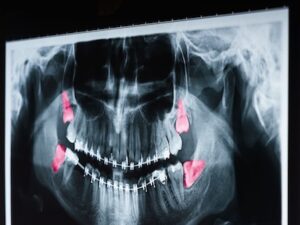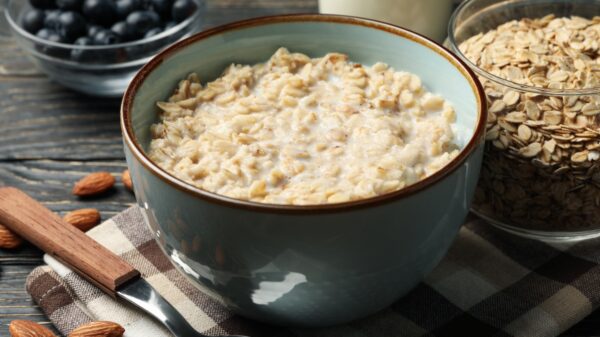Do My Wisdom Teeth Need To Go?
There is a lot of debate surrounding wisdom teeth and whether or not they need to be removed. Some people believe that wisdom teeth are essential for oral health, while others think that they can cause more harm than good. So, what’s the truth? Do wisdom teeth really need to be removed?
The answer to if wisdom teeth need to be removed is that it depends. As it’s recommended to have wisdom teeth removed when they become impacted. This is when they’re growing in at an angle and pushing against other teeth. This can cause pain, infection, and damage to other teeth. In some cases, removal is also recommended to prevent future problems.
Let’s take a look at the pros and cons of wisdom teeth removal to help you make an informed decision.

Wisdom Teeth Removal: The Pros
There are some clear benefits to removing wisdom teeth. It can help to prevent overcrowding in the mouth and help with dental hygiene and maintenance.
Overcrowding
When your wisdom teeth come in, they can cause overcrowding in your mouth. This can lead to a number of problems, including:
Tooth decay. When teeth are too close together, it’s harder to keep them clean. Food and bacteria can get trapped in the spaces between your teeth, leading to tooth decay.
Gum disease. Overcrowding can also make it difficult to brush and floss properly, which can lead to gum disease.
Tooth crowding is a common problem that occurs when the teeth do not have enough room to erupt, or grow, into the mouth. When this happens, the teeth can become crooked or crowded. Tooth crowding can also occur if the jaw is too small or the teeth are too big for the mouth.
Tooth crowding is usually first noticed around the age of 12 when the permanent teeth start to come in. By the age of 18, all 32 permanent teeth should be in place. However, wisdom teeth, or third molars, often do not have enough room to erupt into the mouth and can become impacted. Impacted wisdom teeth can cause pain, infection, and other problems.
Dental Hygiene And Maintenance
Wisdom teeth are the third molars in the back of your mouth. They generally erupt (break through the gums) in your late teens or early twenties. For some people, wisdom teeth never cause any problems and they can brush and floss them just like their other teeth. However, for others, wisdom teeth can become infected, crowd other teeth, or even grow at an angle that makes them difficult to clean. This can lead to tooth decay, gum disease, or other dental problems.
Wisdom teeth that are partially erupted can be difficult to clean properly. This can lead to the buildup of plaque and bacteria, which can cause infections in the gums. Additionally, impacted wisdom teeth (wisdom teeth that have not yet broken through the gum line) can be especially problematic. They may become infected or damage the surrounding teeth.

Wisdom Teeth Removal: The Cons
While there are some clear benefits to removing wisdom teeth, there are also some potential disadvantages.
Surgical Complications
One of the most common complications that can occur during wisdom teeth removal surgery is damage to the adjacent teeth. This can happen if the dentist is not careful when removing the wisdom teeth and accidentally damages the surrounding teeth. In some cases, the dentist may even need to extract one or more of the adjacent teeth in order to prevent further damage.
Another potential complication is damage to the nerves in the mouth, which can lead to numbness or tingling in the lips, tongue, or cheek. This usually occurs if the dentist accidentally hits a nerve when removing the wisdom teeth. In some cases, this damage may be permanent.
Finally, there is a small risk of infection after wisdom teeth removal surgery. This usually happens if the wound is not properly cleaned or if the dentist does not take proper precautions to prevent infection. If an infection does occur, it can usually be treated with antibiotics. However, in rare cases, the infection can spread to the jawbone and other parts of the body, which can be very serious.
Cost
Just like any other surgery, wisdom teeth removal can be costly. Wisdom teeth removal is a common dental procedure. The cost of wisdom teeth removal can vary depending on a number of factors, including the type of procedure, the number of teeth being removed, the location of the dentist, and whether or not insurance will cover the cost. The average cost of wisdom teeth removal is $600-$700 for a single tooth. However, if multiple teeth are being removed, the cost can range from $800-$1,500. Some insurance plans may cover a portion of the cost of wisdom teeth removal. It is important to check with your insurance provider to see if they will cover any of the costs associated with this procedure.
Necessity
It’s estimated that around 85% of people in the United States have their wisdom teeth removed at some point. For many, it’s considered a rite of passage into adulthood. But what if you don’t want your wisdom teeth removed? Is it really necessary?
Wisdom teeth removal is typically recommended when they become impacted, which means they’re growing in at an angle and pushing against other teeth. This can cause pain, infection, and damage to other teeth. In some cases, removal is also recommended to prevent future problems.
If your wisdom teeth are not impacted and are growing in correctly, there’s no need to remove them. In fact, they can be left in place and will eventually fuse to the rest of your teeth. However, you’ll still need to have regular dental checkups to make sure they’re healthy and not causing any problems.

Are There Alternatives?
One alternative to wisdom teeth removal is dental implants. Dental implants are artificial teeth that are surgically implanted into the jawbone. Once in place, they function just like natural teeth. While dental implants can be a great option for some people, they are not right for everyone. In addition, they are typically more expensive than traditional wisdom teeth removal.
Another alternative to wisdom teeth removal is what is known as a “partial denture.” A partial denture is basically a false tooth that is attached to your existing teeth. Partial dentures can be a good option for people who do not want to have their entire mouth reconstructed. However, they are not as strong or durable as dental implants and can be more expensive.
The Bottom Line
So, do wisdom teeth really need to be removed? There is no clear-cut answer. The decision to remove wisdom teeth should be made on a case-by-case basis. If your wisdom teeth are causing problems, such as pain or overcrowding, cosmetic dental surgery and removal may be the best option. However, if they are not causing any problems, there is no need to have them removed. Ultimately, the decision should be made by you and your dentist.












